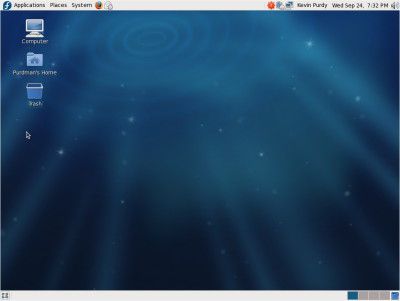From our front-page news:
If you are a frequent reader of our news (I'll assume you are), you are no doubt aware that I'm a Linux user, and a happy one at that. I'm not the type to discredit all other OS' out there though, because even I have a dedicated Windows' machine that I use for Adobe Photoshop and gaming. It's almost a necessary evil to use more than one OS if you happen to want Linux and have important tasks that need to get done that you can only accomplish in Windows, and I envy those who don't have to switch between both (what a time-saver!). But, I digress. If you finally decide to make the shift, how do you know which distro to choose?
Lifehacker hopes to take the complication out of figuring out which distro is right for you by taking a hard look at the three most popular on the market now: Fedora, openSUSE and Ubuntu. You might think that all distros are alike, but that couldn't be further from the truth. Although all have the same underlying kernel, it's the extra things that make a distro special, like the package manager, hardware detection, ease-of-use, et cetera.
Personally, I think all three of those distros are fantastic, but it all depends on what you are looking for. openSUSE is a bit on the friendlier side, so it's great for newer non-techy users, while Ubuntu is for almost everyone... those who know a lot about Linux and those who know little. Fedora is sweet because the developers build a distro that's ideal for the business environment, so stability is key. Those are just my opinions though. The article has even more.

Fedora is the free, consumer-oriented off-shoot of the enterprise Red Hat system, and is funded and founded by that same group. There's a focus on the latest free software and technologies getting onto the desktop quickly, and it supports 32- and 64-bit Intel platforms, along with PowerPC-based Mac hardware—the main reason Linux creator Linus Torvalds uses Fedora 9.
Source: Lifehacker
Lifehacker hopes to take the complication out of figuring out which distro is right for you by taking a hard look at the three most popular on the market now: Fedora, openSUSE and Ubuntu. You might think that all distros are alike, but that couldn't be further from the truth. Although all have the same underlying kernel, it's the extra things that make a distro special, like the package manager, hardware detection, ease-of-use, et cetera.
Personally, I think all three of those distros are fantastic, but it all depends on what you are looking for. openSUSE is a bit on the friendlier side, so it's great for newer non-techy users, while Ubuntu is for almost everyone... those who know a lot about Linux and those who know little. Fedora is sweet because the developers build a distro that's ideal for the business environment, so stability is key. Those are just my opinions though. The article has even more.

Fedora is the free, consumer-oriented off-shoot of the enterprise Red Hat system, and is funded and founded by that same group. There's a focus on the latest free software and technologies getting onto the desktop quickly, and it supports 32- and 64-bit Intel platforms, along with PowerPC-based Mac hardware—the main reason Linux creator Linus Torvalds uses Fedora 9.
Source: Lifehacker
